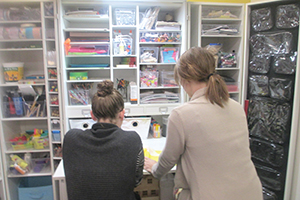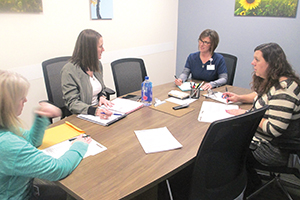By RENEE STOVSKY
In 1989, an unresponsive 2-year-old child was brought to the emergency room of Mercy in Sioux City, Iowa. His stepfather said the boy "fell from a stack of baled hay in the cattle yard," but upon examination, the medical team was convinced the child had been beaten to death. His symptoms — including several fractures and bruises old enough to have yellowed — didn't match up to a single incident injury. Yet the boy's caretakers ultimately were charged only with "wanton neglect" and received a two-year, plea-bargained sentence in the felony case.

Staff members in the art therapy room at Mercy Child Advocacy Center in Sioux City, Iowa.
In contrast, in 2016, Sioux County Attorney Thomas Kunstle was able to successfully prosecute two child abuse cases. The first involved a 33-year-old man, Daren Leikvold, who was found guilty of one count of third-degree sexual abuse and sentenced to 10 years in prison for twice raping a 12-year-old girl. The girl reported the assaults to school officials.
In the second case, the victim was a 15-month-old baby, whose face was bruised when he was physically assaulted by a daycare provider. A jury found Dianna Marie Winder, 33, guilty of child endangerment causing bodily injury, a Class D felony, and assault causing bodily injury, a serious misdemeanor. Winder was sentenced early last year, receiving a suspended five-year prison sentence. She was ordered to serve five months in the Sioux County jail. She is free on bond while her conviction is under appeal.
The difference between the plea bargain resolution and the convictions is related to the strength of the criminal cases, says Kunstle. In both of Kunstle's recent cases, Mercy Child Advocacy Center in Sioux City worked in partnership with area law enforcement agencies, the Iowa Department of Human Services and the Sioux County Attorney's office, to provide the results of medical examinations and videotaped forensic interviews in support of the abuse charges.

Kunstle
"I lean on the staff at MCAC fairly regularly to help investigate suspected child abuse cases," says Kunstle. "Their forensic interviews are tools that can be used by prosecutors, and they are excellent rebuttal witnesses when defense attorneys try to attack a victim's credibility. MCAC's presence in the community has made it easier for authorities to intervene and either stop abuse or remove a child from an abusive situation."
Born of necessity
The center, which celebrated the opening of a new $2.6 million facility in July, began in 1989 as a righteous response to the justice meted out after the abuse and death of that 2-year-old boy at the hands of his caretakers.
"Our entire medical team was distraught after the final determination in that case; we felt we had failed that child," says Barbara Small, clinical manager of the Mercy Child Advocacy Center. She was working as an emergency room nurse at that time. "Our director, Martha Burchard (now retired), realized that our trauma department needed to work more effectively with social services and law enforcement to protect kids. She had heard of a child advocacy center in Cedar Rapids, got a team together to go look at their process, and within a year, started one up here."

Small
Until last summer, the Mercy Child Advocacy Center was in a cramped space in a converted patient unit within Mercy Medical Center, where privacy was at a premium. The center's eight room configuration included a waiting room, exam room, interview room and observation room where a multidisciplinary team could observe a child during a forensic interview. The four staff offices — repurposed patient rooms — housed two or three staff members each.
"When clients got off the elevator, the endoscopy department had to direct them to the Child Advocacy Center," says Small.
The center's new office in a retrofitted warehouse a block from the hospital is almost three times as large as the old office. It has an atrium, a reception area, private waiting rooms for families, observations rooms and age-specific interview and exam rooms for small children and adolescents. Not only does it afford more space for the center's 10-person staff, which includes three forensic interviewers, two SANE-P nurses (Sexual Assault Nurse Examiner-Pediatrics), two therapists, a family advocate, a secretary and Small, but it provides all-important privacy to traumatized children and family members.

Staff members at Mercy Child Advocacy Center in Sioux City, Iowa, and a representative from the Iowa Department of Human Services discuss an upcoming exam of a child abuse victim. The group includes, clockwise from lower left, the center's family advocate Angie Mack, Iowa DHS worker Sara Eastman, Sexual Assault Nurse Examiner-Pediatrics Bobbi Jo Wright, and Sherrie Schweder, a forensic interviewer.
Growing caseload
According to Small, the larger facility was much needed not only by staff but by the greater Sioux City community and center's catchment area as well.
"When MCAC began, we were seeing ab out 300 children a year. Now we serve 800-900 children annually, plus developmentally delayed adults and older people suffering from dementia," she says. "We cover a 200-mile radius that includes parts of South Dakota and Nebraska as well as Iowa, plus two Native American reservations — the Omaha Nation and the Winnebago tribes."
Typically, Small says, children are referred to the center by law enforcement investigating abuse, by the Department of Human Services, the emergency room or private physicians. Upon arrival at the center, and once consent to treat has been obtained, an interviewer will assess a child's level of development and then tailor the interview to be appropriate.
"We need to be careful to let the child tell his or her story without asking leading questions," she says. "Often children are afraid because the perpetrator has threatened family members or pets if the incident — or a long history of incidents — is revealed. "
Next the child is interviewed and asked more pertinent questions related to any abuse. The interview is streamed to a TV in the observation room. Child protection workers and law enforcement officials in attendance may communicate by microphone to the forensic interviewer, relaying questions to clarify a child's response. Following the interview, the child is examined by a Child Advocacy Center physician or a sexual assault nurse examiner who is certified in pediatrics.
Safe shelter
While the child is being interviewed, the center's family advocate meets with the non-offending parent or guardian to identify resources for the child and family. The family advocate will provide support and education throughout the process; and, along with members of the multidisciplinary team involved in the investigation, the family advocate will assess whether the child is safe in his or her home.
Small says that in most cases a child will be able to stay with the non-offending caregiver; but, in cases where that is not possible, children may be placed in foster care or with a relative. It falls to law enforcement or the court to remove a child from an unsafe home; the Child Advocacy Center does not have that authority.
The center provides a summary of its findings to the police, who may, as appropriate, give it to the county attorney who determines if a charge is warranted. Sometimes abusers are arrested right away; sometimes more witnesses may be needed. Oftentimes, if prosecution is deemed appropriate, it can take up to two years for a case to go to court. More often than not, if there is not enough evidence to prove a crime without doubt, the case can wind up in juvenile court in order to provide protective custody or foster care. Though these cases do not result in criminal sanctions for the perpetrator, they can result in parental rights being terminated and the child being put up for adoption.

McConeghey
For the record
"The importance of MCAC is that it's a one-stop shop — a singular opportunity to tell a story," says Monona County Attorney Ian McConeghey. "In 99 percent of child sex abuse cases, the child is the only witness. We depend very heavily on the child to tell their story at MCAC and then to the jury at trial. The structure of MCAC's interviews provides for a non-suggestive, non-leading setting to tell that story. It's a good way to get reliable information. We have no interest in trying to prosecute someone who is not guilty."
McConeghey says that because of the Sixth Amendment's protections for the accused, every child must testify and be subject to questioning in court. Because of the lag in time between an incident and trial dates, some children have no clear recollection of the event by the time they have to take the witness stand.
"In that case, the crucial video recording that MCAC makes can be played to the jury, as long as the child is present and subject to questioning by the defendant," says McConeghey.
The Mercy Child Advocacy Center provides forensic interviewers and clinicians to testify as expert witnesses who help the state make its case.
"The public has lots of misconceptions about child sex abuse; they measure kids by adults' standards and expect them to tell another adult about an incident right away, remember every detail of the abuse and try to avoid the perpetrator," says McConeghey. "MCAC's interviewers can educate (the jury) about things like delayed disclosure phenomenon, sex abuse accommodation syndrome, and the grooming process" that occurs when a predator draws a victim into a sexual relationship and manipulates or intimidates the child into keeping it secret from adults who could intervene.
Unfortunately, McConeghey adds, perpetrators often prey "not on straight-A kids who will tell their parents what has happened" but on "kids who are on the outer edge, without great rapport with adults, or nonverbal, or with developmental disabilities.
"Child centers can be great advocates for those children," he says.
"Often juries are skeptical about how a grown man could have sex with a child without noticeable injuries being present," he says. "Doctors who are experts in child development can provide knowledge about everything from age-appropriate motor skills to dermatological issues like rashes, bruises and healing with the passage of time."

McAllister
Hero's work
Coleman McAllister, assistant attorney general in the Office of the Attorney General of Iowa in Des Moines, has worked with the Mercy center and other child advocacy centers for 17 years to prosecute child endangerment and sex abuse cases.
He calls the Mercy center a "tremendous resource" in preparing and presenting cases.
"Their role as fact gatherers and their training in knowing appropriate strategies to deal with children of various ages is so important," says McAllister, who, with help from the Mercy center, recently won a guilty verdict that put a Lyon County, Iowa, father in prison for 25 years for sexually abusing his 12-year-old daughter, and is planning to use their interviews and testimony in an upcoming sex abuse case involving a 6-year-old.
"Children are so good at compartmentalizing their emotions. Often, they have counterintuitive behaviors, so MCAC materials lend a lot of credibility to our prosecution," McAllister says.
"MCAC does very difficult, demanding work; the staff listens to horrific tales of sexual and physical abuse every day. They should all receive medals," he adds. "We are so grateful they've taken on this mission to serve the interests of the citizens of the state of Iowa."
Copyright © 2018 by the Catholic Health Association
of the United States
For reprint permission, contact Betty Crosby or call (314) 253-3490.